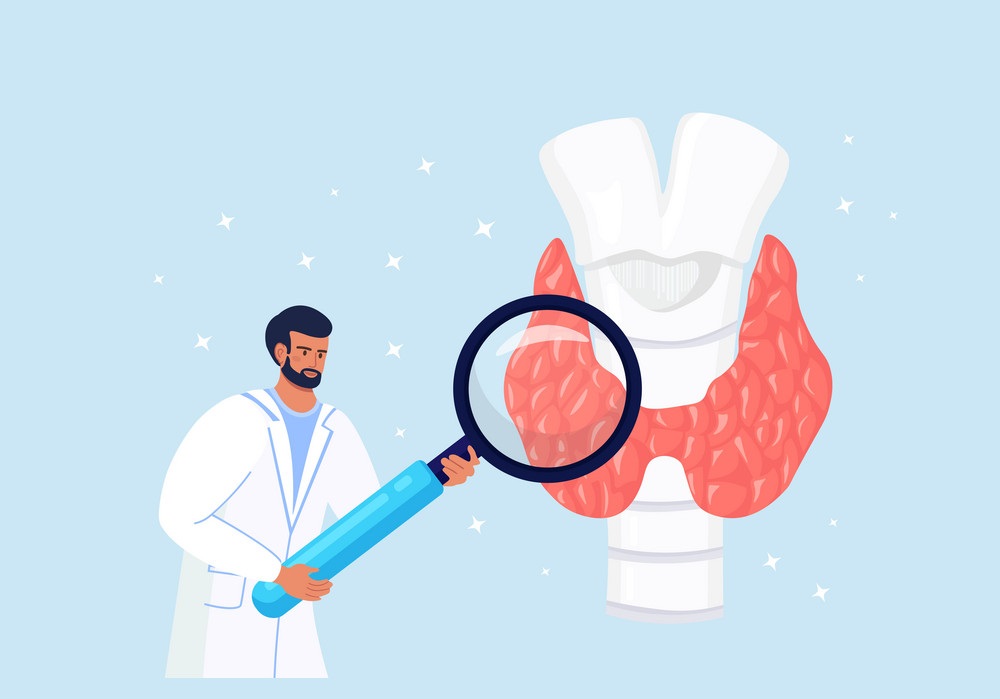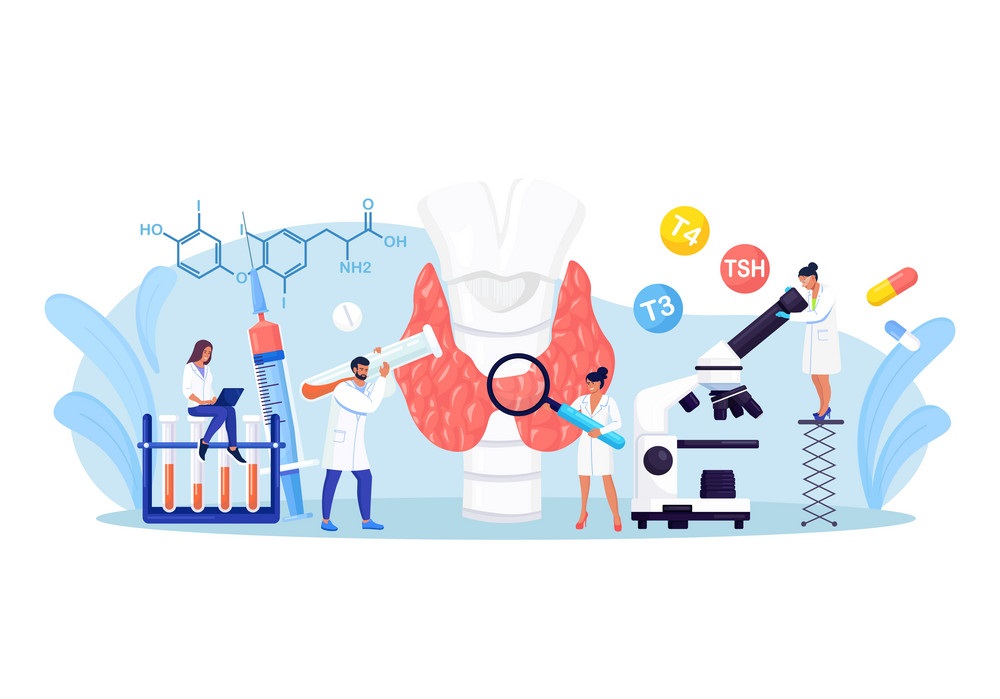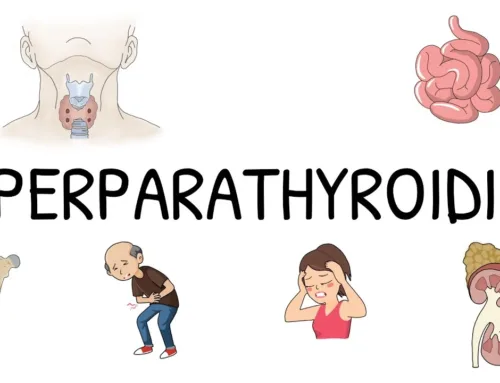If you’re here, you know something’s not right. That’s okay, you’re in a safe place, and you’re about to get a ton of information about thyroid health, disease & treatment. If you don’t know anything about it and think you might have it, don’t worry, we’ll explain all the details of the disease that are going through your mind. A lot of people with thyroid problems don’t know what to do or where to start when learning about the disease.

Source: VectorStock
Thyroid disease is one of the most common health conditions. One out of eight American women over the age of 50 will eventually be diagnosed with hypothyroidism, and up to 44 million Americans are affected. How can you tell if your thyroid is working properly? Is it possible that you have hypothyroidism but haven’t realized it? These are things currently suffering patients ask.
Let this article illuminate your understanding of thyroid disease and guide you through the treatment process. This article will cover everything you need to know about thyroid health and disease. We’ll start by going over the symptoms of thyroid malfunction, why they occur, and how they’re diagnosed. This will be followed by an overview of thyroid disease treatment options.
What Is Thyroid?
The thyroid is a small butterfly-shaped endocrine system gland that is located in the lower front part of your neck. It is one of the most important glands in your endocrine system. The endocrine system is made up of special organs and glands that release hormones directly into the bloodstream. These hormones control many functions, such as:
- Growth and development
- Metabolism
- Birth and sexual maturity
- Blood pressure
- Body temperature

Source: VectorStock
The thyroid gland regulates many of your body’s biochemical processes. Especially metabolism, or how fast or slow your body processes various substances. It also produces several hormones that impact your entire body, including:
- Heart rate
- Brain activity
- Blood pressure
If a person becomes hypothyroid, their metabolism slows down drastically, which can cause weight gain, fatigue, and almost all other symptoms associated with sluggish metabolism and increased body fat storage.
If a person becomes hyperthyroid, their metabolism accelerates, which can cause weight loss, irregular heartbeat, and almost all other symptoms associated with diarrhea and decreased body energy.
Symptoms Of Thyroid Diseases
Thyroid diseases can cause a wide range of symptoms. The symptoms may develop gradually or suddenly and may be mild or severe. The signs and symptoms of thyroid disease vary depending on the type of thyroid problem you have, whether it’s hyperthyroidism or hypothyroidism, and how long it has been present.

Source: VectorStock
The following are common symptoms of thyroid diseases:
- Fatigue (extreme tiredness)
- Memory problems
- Unexplained weight gain or weight loss
- Irregular heart rate
- Coughing up mucus (sputum) after exercising
- Feeling depressed or anxious
- Feeling cold all the time, even in warm weather
- Dry skin and hair loss (alopecia)
- Trouble sleeping (insomnia)
- Muscle weakness and/or pain in the arms or legs
- Shaking
- Numbness in the hands or feet
- Constipation, diarrhea, or other bowel problems
Causes Of Thyroid Diseases
Thyroid disease can be caused by a number of factors, including genetics, lifestyle choices, and environmental factors.
The most common cause is an autoimmune disorder in which the body attacks its own healthy cells, such as Hashimoto’s thyroiditis. This is an inflammation of the thyroid gland that can be either temporary or permanent.
There are also several other causes of thyroid problems, including Graves’ disease and hyperthyroidism, which occur when your body produces too much thyroid hormone. Other causes include iodine deficiency, goiter, and cancer.

Source: VectorStock
1. Autoimmune Disorders
Autoimmune diseases affect about 5 percent of people worldwide and affect multiple organs in your body, including your thyroid gland. These disorders cause your immune system to attack healthy tissue by mistake, causing inflammation and tissue damage throughout your body — including in the thyroid gland itself.
2. Hashimoto’s Thyroiditis
Hashimoto’s thyroiditis is an autoimmune disorder that causes chronic inflammation of the thyroid gland. The condition is often associated with hypothyroidism (low thyroid), although some people with this condition have normal levels of TSH and T4 (thyroid hormones). Hashimoto’s can cause a goiter (enlarged thyroid gland) that can be painful, although many people don’t experience any symptoms at all until they start having problems with their thyroid function.
3. Pregnancy
During pregnancy, many women experience changes in their hormone levels that affect the functioning of their thyroids. For example, there may be an increase in levels of progesterone and estrogen during pregnancy that suppress the production of thyroid-stimulating hormone (TSH), causing hypothyroidism during pregnancy (also known as “postpartum hypothyroidism”). After delivery, TSH levels return to normal within three months for most women who were previously hypothyroid before becoming pregnant or giving birth (also known as “puerperal or postpartum thyroiditis”).
4. Toxic Adenomas
Toxic adenomas are rare tumors that can develop in any organ but are most commonly found in the pituitary gland or lungs. They can produce excess amounts of hormones such as prolactin or growth hormone, as well as thyroid hormones. Toxic adenomas usually occur in middle-aged women but can also be seen in children and older people who have had radiation therapy for cancer treatment or surgery involving the removal of part or all of their stomach/intestine/pancreas/small bowel/large intestine due to cancer.
5. Multinodular Goiter
Multinodular goiter develops when several nodules grow on your thyroid gland at once. These nodules can produce too much hormone over time and may cause symptoms like weight gain and swelling of your neck.
6. Iodine Deficiency
This is the most common cause of thyroid disorders. It occurs when your body does not get enough iodine, which is essential for the normal functioning of the thyroid gland. Iodine is found in foods rich in this mineral, such as milk, eggs, and seafood. Deficiency is most common among people who live in areas where there is little iodine in the soil, such as mountainous regions or inland areas far from sea coasts.
7. Radiation Exposure
Radiation exposure may lead to thyroid cancer or hypothyroidism (underactive thyroid). Radioactive iodine-131, which can be released during nuclear accidents or nuclear weapons tests, can damage the thyroid gland and cause hypothyroidism.
8. Congenital Disorders
Congenital disorders (hereditary conditions) are present at birth and can affect any part of the body’s systems. They may be caused by mutations (changes) in genes passed down from parents to their children through their DNA (deoxyribonucleic acid). Some congenital thyroid diseases include familial medullary carcinoma, familial adenomatous polyposis syndrome (FAP), multiple endocrine neoplasia type 1 (MEN1), and juvenile autoimmune thyroiditis.
How Are Thyroid Problems Diagnosed?
Thyroid disease is one of the most common endocrine disorders in the United States. There are different types of thyroid diseases, and each one can be treated differently. The diagnosis process includes:
- Physical exam
- Blood tests
- Imaging tests

Source: VectorStock
1. Physical Exam
A physical exam will help identify any signs of thyroid disease, such as a goiter or nodules in the neck area. This is a simple, painless test in which the healthcare provider will feel your neck for any thyroid growth or enlargement.
2. Blood Tests
Blood tests will analyze TSH levels and measure hormone levels such as thyroxine (T4) and triiodothyronine (T3).
You can have the following tests done to check your thyroid levels:
-
Thyroid-Stimulating Hormone (TSH)
This is the first test your provider will do to ensure your thyroid levels balance. It is produced in the pituitary gland and regulates the balance of thyroid hormones – including T4 and T3 – in the bloodstream.
The thyroid gland also produces thyroxine (T4) and triiodothyronine (T3), so doctors may also measure these to understand better what’s going on. Signs that your thyroid may not be functioning properly are if your TSH levels fall below 0.40 mIU/mL or exceed 4.50 mIU/mL. (milli-international units per liter of blood).
-
T4
Thyroxine blood tests diagnose and monitor thyroid disorders, with hypothyroidism being shown by low T4 levels and hyperthyroidism showing high T4 levels. The normal range is 5.0-11.0 ug/dL (micrograms per deciliter of blood).
-
FT4
Free T4 (or free thyroxine) is a method of measuring T4 that eliminates the effect of proteins that bind T4 and make accurate measurements difficult. The normal FT4 range for an adult should be 0.9-1,7 ng/dL (nanograms per deciliter of blood).
-
T3
Thyroid hormone tests, like T3 tests, test for hyperthyroidism. They are often used to diagnose and manage people with this condition, as low T3 levels can be detected in a hypothyroid person. The normal T3 range is between 100 and 200 ng/dL. (nanograms per deciliter of blood).
-
FT3
The T3 resin uptake assay, also known as a Free T3 test, measures the amount of free T3 circulating in our body. FT3 levels can be checked by collecting a blood sample and running it through the slot-blot assay. The normal range for FT3 is 2.30 – 4.10 pg/mL (picograms per milliliter of blood).
Additional blood tests might include:
-
Thyroid Antibodies
Many physicians will administer a blood test to diagnose an autoimmune thyroid condition. Common thyroid antibody tests include:
- Microsomal antibodies (also known as thyroid peroxidase antibodies or TPO antibodies)
- Thyroglobulin antibodies (also known as TG antibodies)
- Thyroid receptor antibodies (includes thyroid-stimulating immunoglobulins [TSI] and thyroid blocking immunoglobulins [TBI]).
-
Calcitonin
This test is used to diagnose rare forms of thyroid cancer, c-cell hyperplasia, and medullary thyroid cancer.
-
Thyroglobulin
This test is the first step in diagnosing a possible case of thyroiditis. It is also administered when a patient has been diagnosed with thyroid cancer to monitor treatment progress.
3. Imaging Tests
Imaging tests like a thyroid scan, MRI, or ultrasound can be used to examine the thyroid gland for enlargement or nodules that may indicate cancerous cells.
-
Thyroid Scan
A thyroid scan allows your provider to look at your thyroid to check for increased size, shape, or growths (nodules).
-
Ultrasound
You may think of ultrasounds related to pregnancy, but they are used to diagnose many different issues within your body. Ultrasound is a diagnostic strategy that transmits high-frequency sound waves inaudible to the human ear via body tissues. The echoes are recorded and transformed into video or photographic images. Unlike X-rays, ultrasounds do not use radiation.
Most Common Treatments For Thyroid Diseases
The treatment for thyroid disease depends on the type of condition and how severe it is. The doctor will decide which treatment is best for you.

The most common treatments for thyroid diseases are as follows:
1. Medication
You may be given medication to replace or supplement your thyroid hormones. These drugs are available as pills or shots, depending on the severity of your condition.
The most common medications used for thyroid problems are:
Levothyroxine
Levothyroxine is the most common treatment for hypothyroidism. It is an oral medication that is taken once a day. Levothyroxine tablets are available in generic form and are also available as brand names such as Synthroid, Levoxyl, and Tirosint. Levothyroxine is a synthetic version of the thyroid hormone thyroxine (T4). Your doctor will adjust your dose based on how well your body absorbs the medication and how much T3 you need to make up for the deficiency.
Liothyronine
Liothyronine (T3) is the other main thyroid hormone that helps regulate metabolism and growth. If your doctor suspects that you have an underactive thyroid gland, but your blood tests show normal levels of T4, he or she may also order a blood test for T3 levels. If your T3 levels are low, you may be prescribed liothyronine along with levothyroxine to help you regain normal metabolism functions.
2. Radioactive Iodine Treatment
Some people with Graves’ disease need radioactive iodine therapy (RAI) to destroy their overactive thyroid gland and reduce their symptoms. RAI involves injecting radioactive iodine into your bloodstream, which goes directly to your thyroid gland. The radiation destroys the overactive cells and reduces your symptoms. You may have RAI if you have severe hyperthyroidism caused by Graves’ disease that hasn’t responded to medications or surgery, or if you’ve had multiple surgeries for hyperthyroidism that has returned after each one.
3. Thyroid Hormone Replacement Therapy
The most common treatment for hypothyroidism is taking thyroid hormone replacement drugs (levothyroxine). These are synthetic versions of the hormone and are taken daily. They help to normalize your metabolism, so you can feel better and function normally.
4. Thyroid Surgery
For some people with hypothyroidism, a procedure called thyroidectomy may be recommended to remove all or part of the thyroid gland. If you have hyperthyroidism, surgery may be used to remove all or part of your thyroid gland, although this is rare. Surgery is also done if there is a malignant tumor in your thyroid gland (papillary carcinoma). In some cases, radioactive iodine treatment might be used after surgery to destroy any remaining tissue left behind the surgery.
5. T3 Therapy
This synthetic drug is a combination of T4 and T3, which are types of thyroid hormones that help regulate metabolism. It’s usually used to treat hypothyroidism after other therapies fail to work. Still, it can also be given with levothyroxine if you have hyperthyroidism or are at risk of developing it from Graves’ disease. You’ll need to take T3 therapy every day for several months before you see any improvement in your condition or symptoms, and it can take up to several weeks before you feel better once treatment begins.
Conclusion & Takeaway
Thyroid disease can be a complex and often confusing topic. The thyroid is made up of a number of components, including the thyroid gland and its hormones. But you’re probably asking yourself… How does it all work? And what sets this apart from other diseases dealing with the thyroid? For example, Hashimoto’s is a condition where the immune system is attacking the thyroid gland itself, destroying it over time. It’s important to understand not only why this happens but what effects it has on your health.

Source: VectorStock
To consult with an expert endocrinologist, book an appointment with us. Our team at Houston Endocrine Center welcomes you with warm hearts. We are always ready to serve you with all the needed information and required services.




Leave A Comment